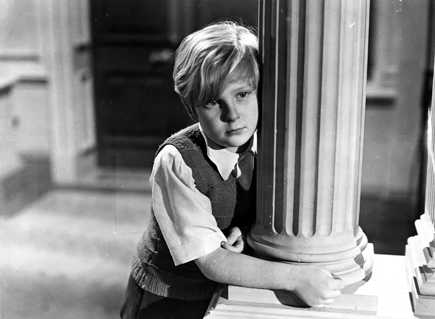By Jerry Tallmer
It must be at least 20 years since a great film called “The Fallen Idol” disappeared off the face of the earth, or in any event off the movie screens of New York City, but the instant 8-year-old Philippe, the French ambassador’s son (just plain Philip or Phil, to Baines the butler), started running across sunlit Belgrave Square toward that tea shop on the other side, my heart leapt into my mouth and stayed there for the next 85 or 90 minutes.
This was at a press screening at Film Forum of the 1948 Graham Greene/Carol Reed masterpiece that, thanks to its resuscitation by Bruce Goldstein’s Rialto Pictures, plays there, on Houston Street, February 10-23.
What Philip will suddenly find, when he dashes into the tea shop, is his good friend Baines — the kid’s strong, staunch ally against the ragings of terrible-tempered Mrs. Baines, killer of MacGregor — deep in conversation with a lovely young woman named Julie whom Baines introduces, in a mumble, as “my niece.”
On the way back across the square to the huge, empty embassy — Philip’s father the ambassador has gone off for some days to bring Philip’s mother home from the hospital — Baines in a casual throwaway suggests to Phil that it might be best not to mention to Mrs. Baines the tea party that’s just taken place.
And with that offhand urging by the boy’s hero, we know we are once again in Greeneland, the endless bleak continent of (well-meaning or otherwise) human fallibility, lies, betrayal, deception, failure, romantic illusion, political illusion, false love, lost love, and corruption of the innocent. It is a continent this explorer, the one you are reading, first discovered long, long ago when his mother advised him he should read an extraordinary book called “The Confidential Agent” by someone named Graham Greene.
All the above plus guilt. “She was what she was because I am what I am,” bedeviled, imperturbable Baines will, half under his breath, say of his wife before we’re out of this particular Greeneland — bedeviled by his own fallibility, his own conscience, the everyman (admitted or not) and possibly everywoman of every marriage that ever was.
That it’s Ralph Richardson who says it, who puts his entire rich-veined multi-colored iron-willed self into controlling the furies here without once raising his voice — external and internal furies — is a good part of what gives “The Fallen Idol’ the seal of greatness. As water regenerates a once green plant, so Richardson in any role, not least that of Baines, regenerates one’s taste for life.
The other part of the greatness is of course the performance throughout by
8-year-old Bobby Henrey, son of author Robert Henrey, as the 8-year-old Philip you cannot take your eyes off of — a pure untrammeled one-of-a-kind performance drawn out of the actual boy, coaxed, wheedled, nursed, observed, steered by Carol Reed, day in, day out, minute in, minute out, as no other director, not Chaplin, not Truffaut, no one, working with children, has ever matched.
A perfect cast all down the line: France’s exquisite Michele Morgan as Julie, the embassy secretary who has made the mistake of falling in love with the stoic, kindly British butler whose wife will never give him up; Yorkshire’s strident Sonia Dresdel as that wife, assassin of MacGregor.
MacGregor was a small snake hidden by Philip behind a loose brick in the wall of the vast embassy on Belgrave Square. “Look, London!” the boy has whispered to the creature from a balcony high over Belgravia as the ambassador’s car pulls away. Mrs. Baines not long later finds MacGregor and tosses the thing into the furnace.
Philip, back in the embassy after the tea shop, will start lying, or trying not to blurt out pieces of truth, to Mrs Baines who, in pursuit of just such truth, will slap and shake him to a fare-thee-well. Phil’s lies and truth get more and more convoluted, conflicted, even to himself, likewise to Baines. “Funny, Julie working at the embassy, and all the time she was your niece.”
When Mrs. Baines, after a screaming showdown with her (outwardly) frozen husband, tumbles 50 feet to her death, young Phil, in his jammies, lights out into the London night. From there on his lies will multiply against lies.
Brought into the Chelsea police station by the bobby who has come upon him in the night, the boy lets slip that he lives in the embassy, and that his father is the ambassador. “Oh, I think I know your daddy,” says a genial streetwalker (wonderful Dora Bryan) who’s on the scene, waiting to be booked. At just the instant she’s embracing the boy with maternal warmth, maternal protection, the station house phone rings with word of a dead body in the embassy.
And then, back at the embassy, when police detectives start arriving in layers (Carol Reed stalwarts Jack Hawkins, Bernard Lee, Denis O’Dea), young Philip’s falsehoods, in his desperate attempts to clear Baines of any link to homicide, multiply exponentially, placing his idol ever more in peril of arrest.
This appraisal will leave you there. The movie will not. The screenplay of “The Fallen Idol” was devised by Graham Greene from his own no-happy-ending short story, “The Basement Room.” He did not like the “Fallen Idol” title imposed on the project by producer Alexander Korda. But to me, it fits rather exactly. We have lots of fallen idols these days, four decades after the film was made. Always have had.
In the space of two years, four decades ago, London-born Carol Reed (1906-1976) made three of the best, most compelling, most ineradicable motion pictures that ever will be: “Odd Man Out” (1947), “The Fallen Idol” (1948), “The Third Man” (1949, screenplay by Graham Greene). You tell me which of those three is the greatest. I wouldn’t try. That, as the British would say, is a mugg’s game.
WWW Downtown Express

































